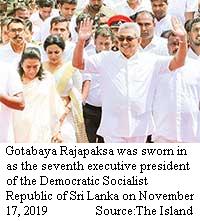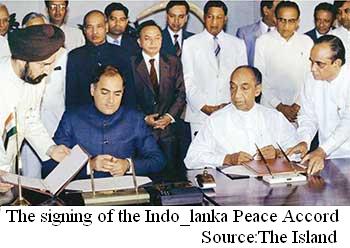|
||||||||
|
|
|
2019-12-10 ArtNo.46660
◆Building a modern state to take Sri Lanka to the next level
 【Colombo】There was recently on social media an image of a president of a western country on foot in the midst of a milling crowd who paid him no special notice with a backpack on his shoulders and carrying a brown paper bag in which was said to be his lunch. President Gotabaya Rajapaksa's style of dressing is likewise unpretentious and simple though he may not be able to walk the streets in that same manner due to the different security and social conditions in Sri Lanka. Nevertheless, the President has won public commendation for the many positive actions he has been taking to streamline governance and they are indicative of a break from the past. The most significant reform is to restrict the size of the Cabinet to 15 ministries and that would have been a difficult task in a polity where the expectation is a minimum of 30 to 40 Cabinet ministers. On the other hand, there could also be other reforms that are popular but which may be more problematic. There will need to be caution in moving forward on them. One such reform being proposed is to abolish the provincial council system in which the central feature is the devolution of power to enable power sharing by the ethnic minority communities who are the majority in two of the country's nine provinces. The provincial council system came into being in November 1987 as a result of the 13th Amendment to the Constitution which was itself an outcome of the Indo-Lanka Peace Accord of July 1987. The signing of the Peace Accord was accompanied by the entry into Sri Lanka of the Indian army, known as the Indian Peacekeeping Force. The unfolding of events was tragic and unexpected, in that neither did the Indian army succeed in disarming the Liberation Tigers of Tamil Eelam (LTTE) nor did the Sri Lankan government properly devolve the promised powers. Today, more than three decades after their establishment, the provincial councils are criticized by most of the Sri Lankan people as being white elephants, wasteful of financial resources and inefficient.  There is much that is deficient in the workings of the provincial councils. There is dissatisfaction within the Tamil polity that they are not given the full powers envisaged in the 13th Amendment. They are seen by the Sinhalese majority as being a potential line of division of the country into two or more separate states and therefore as a potential security threat. Despite these deficiencies, it is important to keep in mind that the provincial council system is an outcome of an agreement with India. It is also a concession to the longstanding demand of the Tamil people of the North and East for some extent of self-rule. Therefore, it is best that any reform or abolition of the provincial councils should be done in consultation with India and with the political parties that represent the Tamil and Muslim people of the North and East. One of the stark features of the recently concluded presidential election was the polarization of votes between the North and East of Sri Lanka, in which the ethnic and religious minorities predominate, and the rest of the country. This is a line of division that needs to be healed early so that Sri Lanka can take the leap to the next level of development as a polity that is united in heart and mind. At the present time, Sri Lanka's economic growth is at the bottom of South Asia, only above war-torn Afghanistan. If Sri Lanka is to benefit maximally from the modernizing vision of President Rajapaksa it needs to be united internally and it also needs the internationally supportive environment that India can help to provide. 【News source】 Building a modern state to take Sri Lanka to the next level ○One world:The aim of SEAnews Your Comments / UnsubscribeTweet to @TwitterDev SEAnews MessengerSEAnewsFacebookSEAnews eBookstoreSEAnews world circulation |
|
[Your Comments / Unsubscribe]/[您的意见/退订]/[ご意見/配信停止]
Please do not directly reply to the e-mail address which is used for delivering the newsletter. 请别用递送新闻的邮件地址而直接回信。 メールをお届けした送信専用アドレスには返信しないで下さい。 |